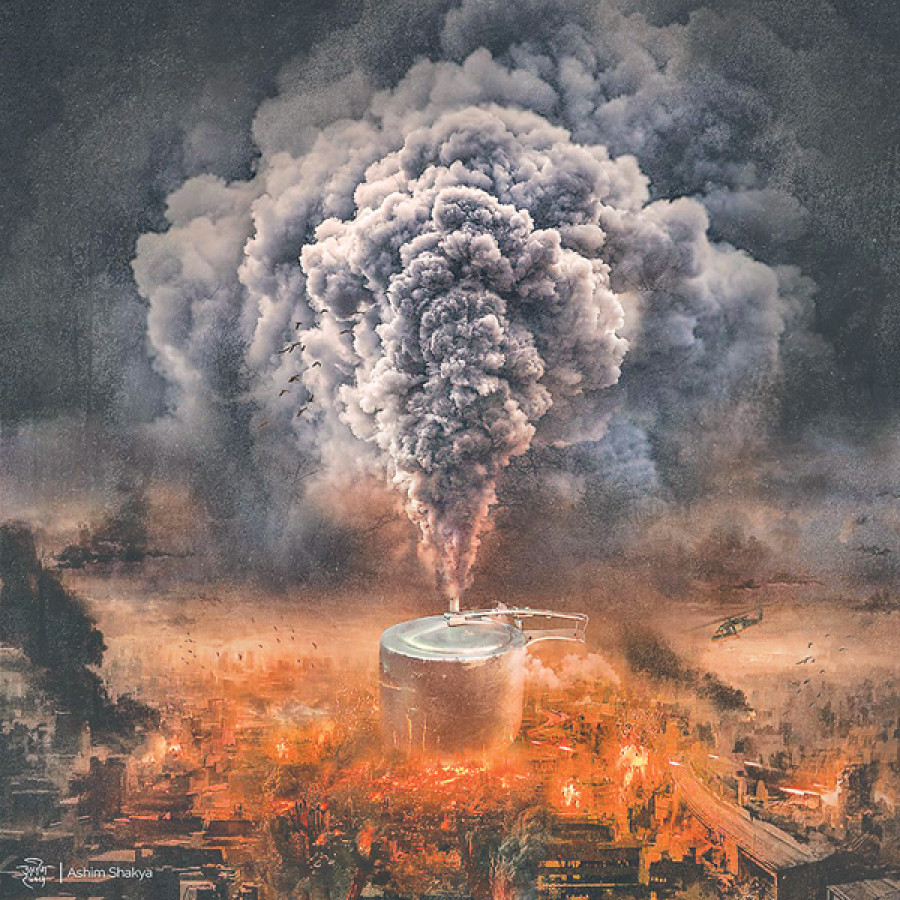Miscellaneous
A city in slumber
Quietly flow the rivers, soundly sleeps Kathmandu. Summer drums its chest with raindrops.
Abhinawa Devkota
Quietly flow the rivers, soundly sleeps Kathmandu. Summer drums its chest with raindrops. Winter slathers its body in a thick fog. The cool mountain breeze licks its bare skin and scallops the clouds hanging over it. Yet it remains totally unaware of the world around it. Maybe the hubbub in its innards is a soft lullaby playing on an infinite loop that keeps it from waking up. Maybe it dreams a never-ending dream like a damsel in a fairytale, sans the prince charming who must come to wake her up.
Else, how could it not remember how the first four were killed? Either hanged, or shot. Wasn’t that the case? In the month of December, when the sky was still dark and dewdrops formed on blades of grass, their lifeless bodies were left in chowks for everyone to see. Crowds, as lifeless as the bodies, stood at a distance and stared at them. Mothers bolted indoors with their little ones. An elderly man circled his dead son hanging down the branch of a tree, his legs shaking, face quivering, hands pressed together, streams of tears running down his cheeks, prayers leaving his mouth in indecipherable whispers as if he were in a temple, revealing to god his secret wishes.
Had it kept its eyes open, it would have not missed the sight of young boys and girls marching through the hills in squiggles. Seething with rage, their eyes as fiery as the red scarves around their heads, hands holding guns taller than their bodies, seeking revenge for the injustice they had suffered form. It would have heard the beating of the drums and crashing of the cymbals before the first shots of the revolution were fired. The whiff of gunpowder would have hit its nose before the smell of burned flesh and rotting bodies had overpowered others.
Had it been in its senses, the car would not have fallen off the cliff and killed the one who must not have died so young; the gun would not have jumped by itself and shot the royals in the head; people would not have divided themselves into tribes and fought for their turfs like they did in ancient days; leaders would not have come to the streets with arrows and spears.
Had it, had it, had it. Darn it. Nothing bothers it at all. It sleeps through chakka jams and hadtals, bandas and curfews. Blockades and blackouts, of which many have taken place, merely prod it to change sides. Its hide is thick enough to bear the sting of tyres burning on its belly, its senses dead enough to not hear the chants of slogans and cries of pain and suffering.
Kathmandu is a city entombed in dust and smoke, so thick that nothing escapes out of it, nothing enters into it—a place where time and dreams are churned into a strange concoction. It is a crystal ball where we live like zombies, unaware of each other, unaware of the world around us, each within their own bubble, each partaking from the city what it gives us.
Thus we howl and cry in the darkness with nobody to listen, we jump and scramble in the daylight with nobody to see. We stand and stare, stand and stare and see not even our own shadows. Our actions are as detached from reality as fantasy is. We are heir to the daydream from which nobody wakes up.
Quietly flow the Bagmati and Bishnumati, soundly sleeps the Valley. Summer sends its veins gushing with rain, winter wets its skin with dewdrops. The cool mountain breeze mingles with its smouldering breath. Yet it never wakes up. It will not warn young kids in fatigues before they fire the first shot, it will not douse the flame of burning tyres on its belly.
Maybe the hubbub in its innards is a soft lullaby playing on an infinite loop that keeps it from waking up. Maybe it dreams a never-ending dream like a damsel in a fairytale.




 9.7°C Kathmandu
9.7°C Kathmandu










